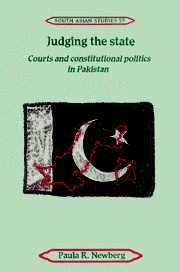Book contents
- Frontmatter
- Contents
- Preface
- Introduction
- 1 Structuring the state
- 2 Constituting the state (1947–1958)
- 3 Confining courts and constitutions (1958–1969)
- 4 Seeking justice (1969–1972)
- 5 Testing courts and constitutionalism (1972–1977)
- 6 Silencing courts, muting justice (1977–1988)
- 7 Reviving judicial powers (1988–1993)
- 8 Judging the state
- Table of cases
- Bibliography
- Index
- Cambridge South Asian Studies
6 - Silencing courts, muting justice (1977–1988)
Published online by Cambridge University Press: 06 January 2010
- Frontmatter
- Contents
- Preface
- Introduction
- 1 Structuring the state
- 2 Constituting the state (1947–1958)
- 3 Confining courts and constitutions (1958–1969)
- 4 Seeking justice (1969–1972)
- 5 Testing courts and constitutionalism (1972–1977)
- 6 Silencing courts, muting justice (1977–1988)
- 7 Reviving judicial powers (1988–1993)
- 8 Judging the state
- Table of cases
- Bibliography
- Index
- Cambridge South Asian Studies
Summary
But I, in the clamour
of breaking bones and spurting blood
had buried the corpse of my hearing
before I could hear
the sound of firing!
Ahmad Nadeem Qasmi, “Firing.”Constitutional Martial Law is a contradiction in terms.
Martial Law means no law.
Justice Karam Elahee ChauhanGeneral Zia ul Haq assumed power coincident with regional events that proved vital for his regime's tenure. India's Congress Party was voted out of office after allegations of repression and corruption that resembled those lodged against Mr. Bhutto and the two new governments warily recast Pakistani–Indian relations. Iran's peacock throne was overthrown, the Shah dispatched overseas while revolution engulfed the country. The American withdrawal from Iran and the initial successes of the Islamic revolution helped provide political focus for General Zia, who added a strong Islamist tone to his policies while courting favor with the United States after its unhappy interlude with the Bhutto government's policy of foreign policy autonomy. Equally critical, revolution and instability in Afghanistan resulted in the Soviet army's incursion there at the end of 1979, starting a decade-long war whose refugees, guns and drugs would occupy Pakistani society and realign international backing for its military leaders.
These external forces reinforced abrupt changes in Pakistan itself. Despite his protestations to the contrary, General Zia took quick action after the coup d'état to alter the structure of the Pakistani state.
- Type
- Chapter
- Information
- Judging the StateCourts and Constitutional Politics in Pakistan, pp. 171 - 199Publisher: Cambridge University PressPrint publication year: 1995

